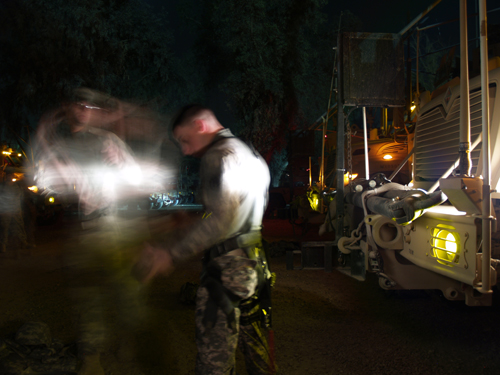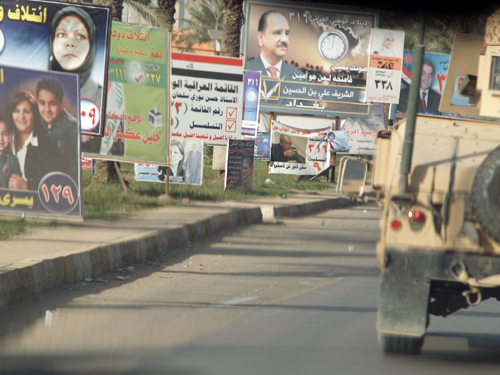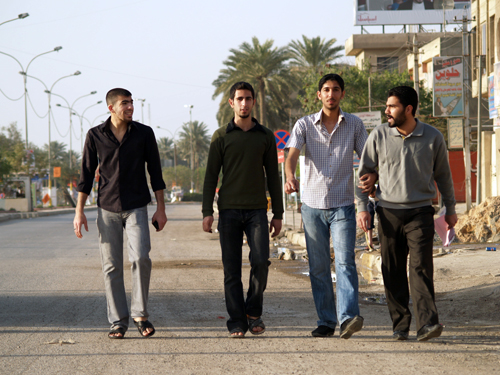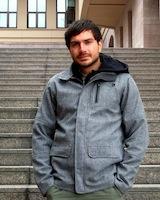
Baghdad: Election Day

American soldiers in the headlights of their armored vehicles. (Dimiter Kenarov)
4:00 AM
Under the quarter moon, in the high beams of their armored vehicles, US soldiers are gearing up for the most important day of the Iraq War. Seven years ago, this month, the United States and its “Coalition of the Willing” invaded in a bid to oust Saddam Hussein and seize his cache of weapons of mass destruction. When WMDs turned out to be a mirage, bringing democracy to Iraq became the war’s new raison d’être. Seven years after the beginning of the war, on March 7, 2010, the reality of Iraqi democracy is put to the test.
Light streaks the eastern horizon. The ghosts of date palms and eucalyptus trees come out of hiding. Somebody adjusts the straps of his Kevlar. Humvees and MRAPs are growling, impatient like hungry dogs. Then the troops gather in a circle for their mission brief and prayer. “Guys, today is the most important day you’re gonna have,” says Captain Barr, a man with the countenance of a child. Faces are serious, lost in thought. So this is it. The Big Day. If everything goes well today, we will all finally get to go home. When the convoy rolls out, the only thing missing is a marching band and a cheerleader twirling a baton.
11:00 AM
Hurry up and wait. The Army’s unofficial motto. We are waiting for the Special Representative of the United Nation’s Secretary-General for Iraq, Adrianus Petrus Wilhelmus Ad Melkert, to arrive at the Baghdad Airport on the Victory Base Complex, so we can escort him to polling stations around the city and then to a press conference at the Al Rasheed hotel in the International Zone. Engines are idling. We have all sloughed off our body armor, Kevlars carelessly scattered on the gravel lot like empty seashells. Though the March sun is still merciful, everyone is cowering in the iron shade of their vehicles. Soldiers are taking a nap, or reading, or playing around with their iPods.
The whole morning we’ve been hearing explosions out in the distance, toward central Baghdad. Boom. Then again, much closer. BOOM. Boom. BOOM. We are counting. Two, four, seven, ten, twelve. By noon I’ve counted fifteen explosions. They could be anything: mortars, rockets, IEDs, VBIEDs (Vehicle Borne IEDs), PBIEDs (Person Borne IEDs), RPGs, EFPs (Explosively Formed Penetrators). Acronyms concealing deadly shrapnel. Rumors are starting to trickle in but nobody knows much yet. Eighteen attacks. No, thirty. No, sixty. Soon, the numbers pile up and cease to matter. The blasts are like hiccups—annoying but easy to ignore. Boom. You turn the next page. BOOM. You turn up the volume of the iPod. Boredom seems a greater enemy than bombs.
I decide to walk around a bit and talk to some of the soldiers. What do you think about the elections? Boom. Do you think the Iraqi security forces will be able to take over? Boom. What do you think about the future of Iraq? BOOM.
Specialist Moser: “It’s a great day. It’s a beautiful day.”
Captain Richards: “Every day is dangerous in Iraq, but this one in particular—we’ve got lots of tension today. But it’s their country and they have to figure things out on their own. We are here just to assist them now. We are soldiers, and we go where we are told to go. It’s a job.”
Sergeant Gassler: “It’s a job.”
Private Zimerman: “It’s definitely time for us to withdraw. It’s time for us to head home and call the mission complete. I’ve been a lot around this country, and it’s much safer now.”
Sergeant Gassler: “The mission is a success so far. For me it’s a success just getting ourselves and our equipment safely back home.”
Sergeant Keen: “I don’t think the Iraqis are ready to take over. Their intelligence is not up to the task.”
Sergeant Thomas: “There’s been a lot of improvement. And that’s no talking point. I think we wasted a lot of money, no question. But the Iraqi security forces are doing much better now. It will be tough without the American forces here, but they need to be given a chance. They are doing that right now with the elections. At the same time, what are we getting out of this? A smile from the Iraqis? A smile for trillions of dollars. I’d smile for that amount of money any day.”
3:00 PM
We are still waiting and I’m getting antsy. By now, half of the world knows more about what is happening in Baghdad than I do. Ad Melkert, the UN representative, has arrived, but his personal security detail and the US commanders are trying to agree on the safest route into downtown Baghdad. There have been no explosions in the last hour or so, but our large convoy would certainly draw a lot of attention. “If he doesn’t go into Baghdad, what does that say to the Iraqis,” one soldier muses. “And if he gets killed on the way, what does that say,” another counters.
After some more deliberation, our convoy is finally on the move. I’m riding in a non-tactical vehicle (NTV), an up-armored Chevy Suburban, with five soldiers. Of course, IEDs could easily destroy a Humvee or even an MRAP, but our civilian car is more like a bark in the middle of the ocean. The smallest wave and we would be heading straight for the bottom. There are attempts at gallows humor (“If you get shot in the head,” a soldier tells me laughing, “I’ll apply a tourniquet.”), but the mood is still bleak. On the car radio, faint but audible, I can hear the Cranberries. What’s in your head, in your heeeeead, Zombie, Zombie, Zombie …
4:00 PM

The abandoned streets of Baghdad. (Dimiter Kenarov)
Baghdad is a ghost town. In this city of monstrous traffic jams, where driving is a form of war, the empty boulevards look alien, as if some genie has made all vehicles disappear with a snap of his fingers. It is not, however, the absence of moving cars (required by the election curfew) that makes everything nightmarishly calm. It is the complete absence of people. And, most of all, the election posters lining every street, every sidewalk. Faces everywhere—hundreds, thousands, hundreds of thousands of faces—not one of them living and real.
We drive on, passing through the neighborhood of Al Mansur and Al Mutanabbi. Here, too, except for the Iraqi Federal Police idly sitting and smoking cigarettes by their blue-and-white armored personnel carriers, there are few signs of life. Two men digging a ditch, a boy drinking water out of a hose, construction workers mixing cement. But where has everyone else gone?
Our convoy arrives at the polling station. The Humvees and MRAPs cordon off the area, and we all step out. Move, move, move. While we are waiting for Ad Melkert to make his appearance, I spot a father and his little daughter walking hand in hand down the street. Then another family of five. Four young men with their index fingers newly purpled by ink—the sign of having cast a ballot. I approach one of the Iraqi policemen standing guard and ask him about the voting atmosphere. “A lot of people showed up to vote in the morning, but after the multiple bombings around noon, almost everyone disappeared. Some have returned to the streets, but most people are scared.” I take a few more shots with my camera. Here, in this ancient land of suffering, even the sufferers has become invisible.

The two men in the middle have inkstained index fingers, indicating that they have voted. (Dimiter Kenarov)
5:00 PM
End of the elections. Reports are coming from all over the country. People were initially scared off by the intensity of the attacks but remained defiant in the face of danger and voted in great numbers. At the press conference at Al Rasheed, Ad Melkert, says: “Overall, the organization was quite strong and definitely the best Iraq has seen in the series of elections.”
Outside of the hotel, I stop to talk to Shuan Abdul Hassan, a man in his twenties. Dressed in well-pressed pants and dinner jacket, he wears a huge smile. His index finger is inked, the color of a bruise. He tells me that his father and uncle were killed by Saddam’s regime, and he’s happy that Iraqis are finally free to choose their own leaders. What would happen to Iraq after the Americans leave, I ask him. His mood darkens. “If the American leave, this country would probably collapse. People will once again start fighting each other and terrorists might come back. They’ll say ours is a puppet government set up by the Americans. This country will go boom.”
Dimiter Kenarov is in Baghdad with a grant from the Pulitzer Center on Crisis Reporting. Learn more about this project on the Pulitzer website.

